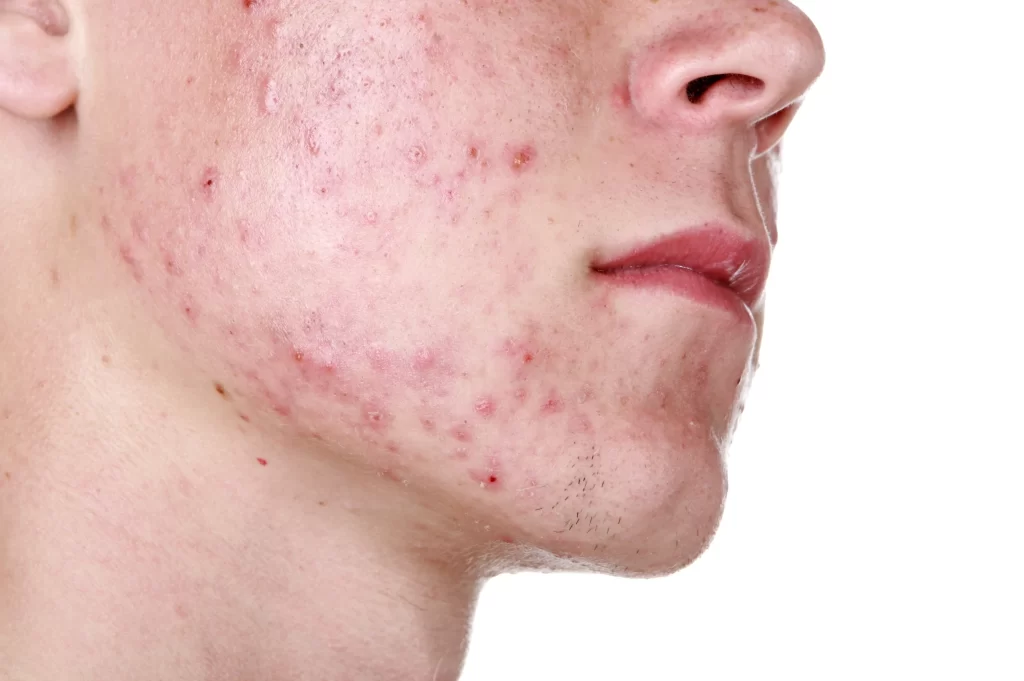No matter your age, acne is frustrating. For some, once one set of pimples and bumps go away, more crop up the next day. It can be a vicious cycle for those who haven’t found the right treatment.
Severe acne (cystic or nodular acne) is classified as painful breakouts deep in the skin. If left untreated, it can cause permanent scarring. You are most likely to have severe acne in your teens or early 20s on your face, chest, back, upper arms and shoulders.
Isotretinoin, more commonly referred to as Accutane, is one of the most effective treatments for severe types of acne.
Severe cystic acne is more common in men, but women often have cysts on the lower half of their face.
In this blog, we talk about how to use Accutane and the importance of not getting pregnant while taking the drug.
DIFFERENT TYPES OF ACNE
Acne varies depending on the severity of your condition.
- Whiteheads are closed, clogged pores
- Blackheads are open, clogged pores
- Papules are small red, tender bumps
- Pustules (Pimples) are papules containing pus
- Large, firm, painful lumps beneath the surface of the skin are nodules
- Painful, pus-filled lumps beneath the surface of the skin are cystic lesions
Accutane works for even the most severe acne cases including nodules and cystic lesions.

HOW ACCUTANE WORKS
Accutane is a vitamin A-based medication that reduces sebum (your body’s natural oil) production by shrinking oil glands, slowing down cell production inside pores and killing acne-causing bacteria.
It prevents new acne from forming, while healing current breakouts. However, there are many side effects of Accutane that your doctor or dermatologist will need to fully address before deciding if Accutane is right for you.
SIDE EFFECTS OF ACCUTANE
Common side effects of Accutane include:
- Rash
- Dry skin
- Skin inflammation
- Upset stomach
- Nosebleeds
- Minor swelling of the eyelids or lips
Other more serious side effects include:
- Respiratory issues
- Blood abnormalities
- Severe headache
- Joint pain
- Hair loss
- Depression
- Vision loss
Because Accutane essentially halts oil production, dry skin and chapped lips are almost a given. However, temporary hair thinning, intestinal symptoms, urinary symptoms, depression and decreased night vision happened 15% or less of studied cases. If you start experiencing any of the more serious side effects while taking Accutane, be sure to stop taking the drug immediately and call your doctor.
PRECAUTIONS WHEN TAKING ACCUTANE
When discussing Accutane with your doctor, be sure to tell him or her if you or a family member has any of the following health conditions:
- Mental illness
- Asthma
- Liver disease
- Diabetes
- Heart disease
- Bone loss or weak bones
- Anorexia Nervosa
- Food or medicine allergies
Women who are pregnant or breastfeeding cannot use Accutane.
You must also discuss with your doctor all the medicine you are currently taking including prescription and non-prescription medicines, vitamins and supplements. Some medicines can interact with Accutane, causing more serious side effects.
WHAT TO AVOID WHILE TAKING ACCUTANE
- Do not get pregnant while taking Accutane and for one month after stopping Accutane
- Do not breastfeed while taking Accutane and for one month after stopping Accutane
- Do not give blood while taking Accutane and for one month after stopping Accutane
- Do not take other medicines or supplements with Accutane unless discussed with your doctor
- Do not drive at night until you know for sure Accutane has not affected your vision
- Do not have cosmetic procedures to smooth your skin, including waxing, dermabrasion or laser procedures while using Accutane and for six months after you stop. Accutane can increase your chance of scarring from these procedures.
- Avoid sunlight and UV lights. Do not use tanning beds. Accutane may make your skin more sensitive to light.
- Do not share Accutane with anyone else. It can cause birth defects and other serious health problems.
It is extremely important a female patient does not get pregnant while taking Accutane. Serious birth defects can occur as a result of taking this medication.
You will need to enroll in the iPLEDGE program before you start taking Accutane to help you prepare, plan treatment and prevent pregnancies during the course of Accutane treatment.
PREGNANCY WHILE TAKING ACCUTANE
You must not get pregnant right before starting Accutane, while taking it and for one month after your last dose. There is a very high chance your baby could be deformed, born too early or even die. This can happen even if you take Accutane for a short period of time.
Even if you are not sexually active, you will still need to follow all the requirements of the iPLEDGE program.
To keep from getting pregnant, you will need to use two effective forms of birth control throughout your treatment, including: at least one month before starting Accutane, while taking it (usually four to five months of treatment) and for one month after your last dose.
Using two forms of birth control drastically reduces the chance that you will become pregnant. Most female patients who became pregnant during Accutane treatment were using only one form of birth control.
You will need to choose one primary form of birth control and one secondary form.
Primary forms of birth control include:
- Tubal sterilization
- Partner’s vasectomy
- Intrauterine device (IUD)
- Hormonal (combination birth control pills, skin patches, shots, under-the-skin implants or vaginal ring)
Progesterone-only “mini pills” are not considered an effective form of birth control for the iPLEDGE program.
Secondary forms of birth control include:
- Diaphragm WITH spermicide
- Cervical cap WITH spermicide
- Male latex condom with or without spermicide
- Vaginal sponge (contains spermicide)
- One month before starting Accutane treatment, you will need to take a pregnancy test.
- Upon receiving your first prescription, you must have a second pregnancy test within the first five days of your menstrual period (at least 30 days after registration).
- During treatment, you will have to take a monthly pregnancy test.
- After treatment, you will have a final pregnancy test one month after your last dose.
While planning to take Accutane, your doctor will give you the iPLEDGE booklet, which will be your guide throughout treatment and answer all the most frequently asked questions. Be sure to discuss anything you may not understand in detail with your doctor.
DERMATOLOGY CENTER FOR SKIN HEALTH | ACNE TREATMENTS IN MORGANTOWN
Acne is one of the most frequent skin conditions we see in our office.
Every year, about 80 percent of adolescents have some form of acne, and about 5 percent of adults experience acne. Treating acne is a relatively slow process; there is no overnight remedy.
If you would like to schedule a consultation with one of our dermatologists to see if Accutane is a treatment option for you, please call our office today: 304-598-3888.
If you would like to learn more about what causes acne and other non-prescription treatment options, download our Guide to Acne below:


